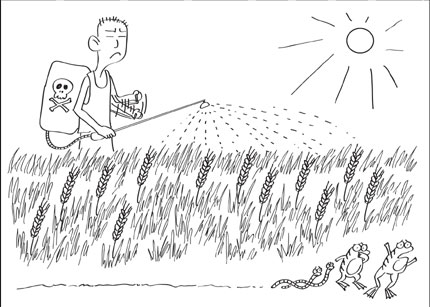Precious but polluted earth vanishes
 0 Comment(s)
0 Comment(s) Print
Print E-mail Shanghai Daily, June 13, 2012
E-mail Shanghai Daily, June 13, 2012
In today's opinion page, Alexander Likhotal makes a compelling case against nuclear power. He argues that several decades after Chernobyl, Prypyat, the meltdown's epicenter, is still deserted and the level of radioactivity in the area remains forbidding.
|
|
|
[By Zhou Tao/Shanghai Daily] |
One of the disaster's most enduring environmental damage is to arable land. The once-fertile land in and surrounding Prypyat has been rendered unusable for ages by radiation, says Likhotal.
While a Chernobyl and last year's Fukushima meltdown are enough grounds for many countries to rethink their energy strategy, we tend to neglect environmental crises that are less dramatic but threaten to do equally significant damage.
A nuclear meltdown kills off tens of thousands in the blink of an eye, but soil pollution can do the same over a long period, and this sometimes happens without our notice. Luckily, the alarm has been raised with a string of reports about soil pollution in China. Its extent was unknown to the public until Caixin media broke a story last year about heavy metal contamination of rice harvests in many parts of China.
China's earth is the most polluted in the world and the situation will only worsen for another 30 years, Professor Pan Genxing of Nanjing Agricultural University is quoted as saying in a report published by the Economic Observer newspaper on June 11.
This is beginning to threaten the country's food supply in unnoticeable ways. In northeastern China, which grows a fifth of the nation's food, a vast expanse of fertile "black earth," or chernozem in Russian, has diminished by 50 percent over the past half century as a result of pollution. It takes more than 100 years for a mere centimeter of the nutrient-rich soil to accumulate, and now it is disappearing at a speed of one centimeter a year, the report says.
Experts warn that thinner black earth can do irreparable damage to the bread basket that is northeast China.
A well-known culprit of this environmental degradation is the industrial waste that's discharged without treatment. More than 10 percent of the nation's arable land has been rendered unsuitable for agriculture by heavy metal pollution, state data show.
This raises the stakes in the fight to protect the country's 1.8 billion mu, or 120 million hectares, of arable land - less from encroaching property developers than from pollution.
A lesser known aspect of soil pollution confronting China is that it is partly caused by overuse of schemical fertilizer and pesticides. According to Zhang Weili, a researcher at the Chinese Academy of Agricultural Sciences, China uses 1.3 million tons of pesticide a year, 2 1/2 times the world average. What's worse, only 30 percent of the pesticide and fertilizer is effective, the rest ends up polluting the environment.
Researchers at Yunnan Agricultural University recently found that nationwide, a paltry 0.1 percent of the pesticide sprayed on crops is effective in killing the target pests, while 99.9 percent has entered the ecosystem and aggravated pollution.
Chinese traditionally relied on biological agents for pest control. Earthworms help enrich and aerate soil. Frogs prey upon pests. But with their populations dwindling, soil becomes less rich in organic compounds and pests surge in numbers in the absence of predators, said Pan, the agricultural researcher.
The decreased quality of soil and its waning self-cleansing ability cost us a yearly agricultural yield of 10 billion kilograms, the report says.
We may eventually feel nature's wrath more acutely as it exacts "revenge," says Pan, in the form of poisoned food chains or major public health fiascos.
But some officials defend the use of pesticide, since "it can reduce harvest loss to pest damage of up to 40 percent," Zhou Puguo, an official with the Ministry of Agriculture, told the People's Daily on June 11. What's needed is legislation to limit pesticide residue on food within safety margins, he added.
Connivance
Of course, at the heart of the soil pollution is the connivance of some localities toward large polluters. The concept that GDP growth is worth pursuing despite the risk of being poisoned to death still resonates in the hinterland and some third-tier cities thirsty for development.
While the odds of the battle against pollution hinge largely on official wisdom to balance development and environmental protection, it is important that authorities are not smug about glimmering statistics of agricultural output.
Statistics are deceptive. Introduction of strains of crops with a higher yield, better irrigation systems and overuse of fertilizer have reportedly contributed to higher output in northeastern China over the years - at the same time its black earth is vanishing.
The contrasting reality is a reminder that the formidable task to preserve arable land leaves no room for complacency.






